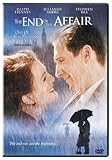The End of the Afair
The book The End of the Afair was made into the movie The End of the Affair.
Book details for The End of the AfairThe End of the Afair was written by Graham Greene. The book was published in 1951 by Penguin Classics. More information on the book is available on Amazon.com. Graham Greene also wrote The Quiet American (1955), Honorary Consul (1973) and The Human Factor (1978). |
 |
Bendrix, as evidenced by his ability to tell the story, is not dead, merely unconscious, and so Sarah must keep her promise. She breaks off the relationship without giving a reason, leaving Bendrix mystified and angry. The only explanation he can think of is that she's left him for another man. It isn't until years later, when he hires a private detective to ascertain the truth, that he learns of her impassioned vow. Sarah herself comes to understand her move through a strange rationalization. Writing to God in her journal, she says:
You willed our separation, but he [Bendrix] willed it too. He worked for it with his anger and his jealousy, and he worked for it with his love. For he gave me so much love, and I gave him so much love that soon there wasn't anything left, when we'd finished, but You.It's as though the pull toward faith were inevitable, if incomprehensible--perhaps as punishment for her sin of adultery. In her final years, Sarah's faith only deepens, even as she remains haunted by the bombing and the power of her own attraction to God. Set against the backdrop of a war-ravaged city, The End of the Affair is equally haunting as it lays forth the question of what constitutes love in troubling, unequivocal terms. --Melanie Rehak
Movie details for The End of the AffairThe movie was released in 1999 and directed by Neil Jordan, who also directed Interview with the Vampire (1994), The Butcher Boy (1997) and Breakfast on Pluto (2005). The End of the Affair was produced by Sony Pictures. More information on the movie is available on Amazon.com and also IMDb. Actors on this movie include Ralph Fiennes, Stephen Rea, Julianne Moore, Heather-Jay Jones, James Bolam, Ian Hart, Sam Bould, Cyril Shaps, Penny Morrell, Simon Fisher-Turner, Jason Isaacs, Deborah Findlay, Nicholas Hewetson, Jack McKenzie and Nic Main. |
 |
Jordan's cool remove captures the unease beneath formal manners but never warms into intimacy during the scenes between the lovers, even while Fiennes and Moore almost explode in repressed emotions, their faces cracking under their masks of civility and their resolve shaking through jittery body language. There's more thought than feeling behind this collision of passion and spirituality, but it's a sincere, richly realized portrait of ennui and rage against God energized by brief moments of shattering drama. --Sean Axmaker